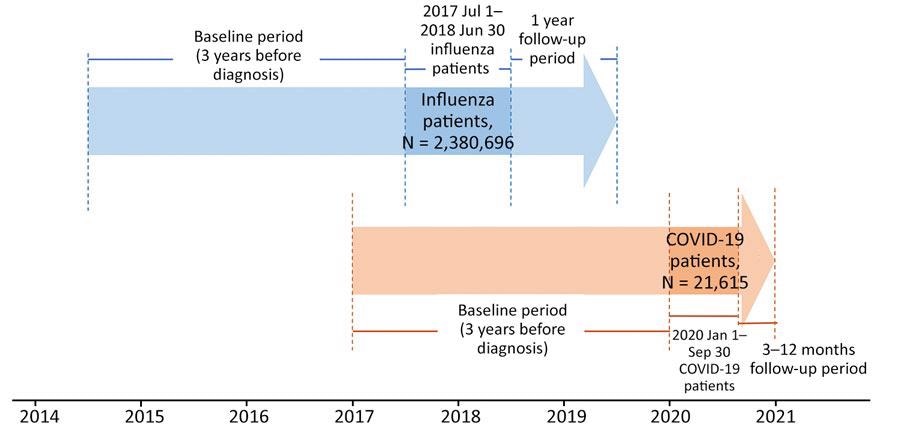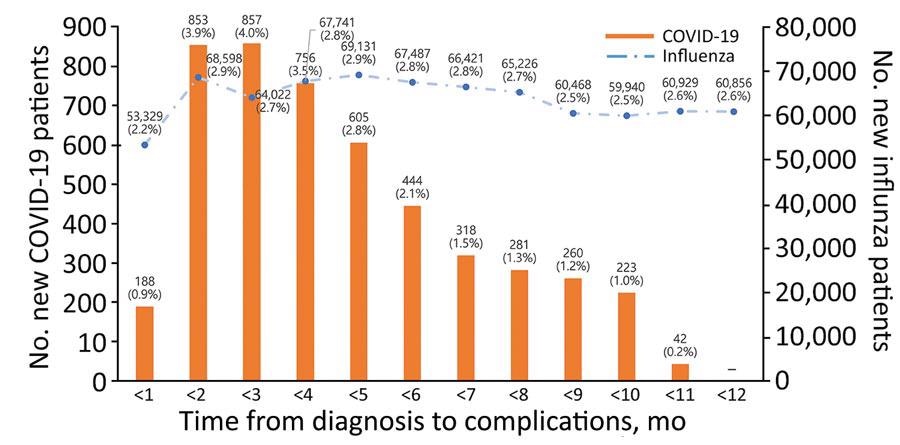In a recent study published in the United States Centers for Disease Control and Prevention (CDC) Emerging Infectious Diseases journal, researchers compare the number, types, and risk for complications among coronavirus disease 2019 (COVID-19) and influenza patients using claims data.
Background
The National Institute for Health and Care Excellence in South Korea defined long COVID as signs and symptoms that develop during or after COVID-19, persist for more than four weeks, and do not have an alternative diagnosis.
Several types of long-term COVID-19 complications have been reported worldwide, including fatigue, dyspnea, fibrosis, inflammation of the lungs, cognitive impairment, and cerebrovascular diseases. Although the need for therapeutic management of post-COVID syndrome was also significantly high, there is a lack of clear understanding regarding incidence, symptoms, and risk of COVID-19 complications.
While a previous study compared the illness and mortality rates of hospitalized COVID-19 and influenza patients, it did not account for non-hospitalized patients with mild COVID-19 and influenza cases.
About the study
In the present retrospective cohort study, researchers determine and compare the number, types, and vulnerable groups for COVID-19 and influenza complications.
The claims data containing medication use, diagnosis, and treatment history of influenza and COVID-19 patients was provided by the Health Insurance Review and Assessment Service (HIRA) in South Korea. The diagnosis code was based on the seventh edition of the Korean Standard Classification of Diseases and Causes of Death (KCD-7). In addition, the subjects were categorized based on age, gender, region, insurance type, Charlson comorbidity index (CCI), complications, and severity.
A total of 21,615 patients diagnosed or treated for COVID-19 based on KCD-7 code U07.1 from January 1, 2020, to September 30, 2020, were enrolled in the study. Similarly, 2,380,696 patients who were either prescribed oseltamivir, zanamivir, amantadine or had influenza diagnosed based on KCD-7 code J09-J11 from July 1, 2017, to June 30, 2018, were also included.
COVID-19 and influenza complications included the newly diagnosed signs and symptoms during the follow-up period after COVID-19 or influenza diagnosis and not previously diagnosed in the past three years among these patients. Therefore, COVID-19 and influenza patients were monitored from the diagnosed date to December 31, 2020, and up to a year after diagnosis, respectively.
Study findings
The results indicated that 4,139 COVID-19 patients and 678,845 influenza patients had more than one complication. Complications such as skin disease, pneumonia, and asthma were more prevalent in influenza groups than in COVID-19 groups, even after adjusting for age. However, the relative risks (RR) for hair loss, heart failure, dementia, and mood disorder were higher in the COVID-19 groups.
Among the COVID-19 groups, the 20–44-year age group had the highest odds ratio (OR) for the risk of COVID-19 complications. Further, National Health Insurance Service (NHIS) beneficiaries had a lower risk for complications than medical-aid (MA) recipients.
A total of 4,963 residents from the Daegu and Gyeongsangbuk provinces were diagnosed with COVID-19, while there was no regional influenza epidemic. Moreover, COVID-19 patients from these provinces had an OR of 1.44 higher than other areas.

Study design for comparison of complications in coronavirus disease and influenza patients, South Korea. COVID-19, coronavirus disease.
The number of COVID-19 patients admitted with mild and severe cases was more than the number of hospitalized influenza patients. Further, hospitalized mild or severe COVID-19 patients had a higher OR than non-hospitalized COVID-19 patients.
Among the influenza groups, the OR for risk of complications was 1.04 in females. While the OR was lower in individuals 19 years or younger and those between 45 and 64 years of age, it was higher in those aged between 65 and 74 years and 75 years or older.

Time from diagnosis of COVID-19 or influenza to complications in a study comparing complications in the 2 diseases, South Korea. COVID-19, coronavirus disease.
The risk for influenza complications was lower in NHIS beneficiaries than the MA recipients. However, influenza patients with a CCI score of one to two or more than three points had a higher risk of influenza complications than those with zero CCI scores. Further, influenza patients admitted with mild or severe disease had a higher OR than ambulatory patients.
After one and two to three months of COVID-19 diagnosis, 188 and 1,711 patients, respectively, experienced complications. Comparatively, patients who were one, two, and six months post-influenza diagnosis, which included 53,332, 68,608, and 373,853 patients, respectively, had complications.
Conclusions
The current study demonstrates that the rate of COVID-19 complications was similar to or lower than the rate of influenza complications. However, the RR of dementia, hair loss, mood disorders, and heart failure in COVID-19 was slightly higher than that of influenza.
According to the subgroup analysis, the risk for mood disorders and dementia and hair loss was relatively higher in elderly patients and younger adults, respectively. In addition, there was a higher incidence of pneumonia and cardiovascular disease in elderly patients and groups with high CCI scores. In contrast, the risk for mood disorders, cerebrovascular disease, and dementia was higher in the residents of Gyeongsangbuk and Daegu provinces.
While COVID-19-associated complications were milder than influenza complications, the study highlights the need to practice caution against COVID-19 since the fatality rate is a significant concern.